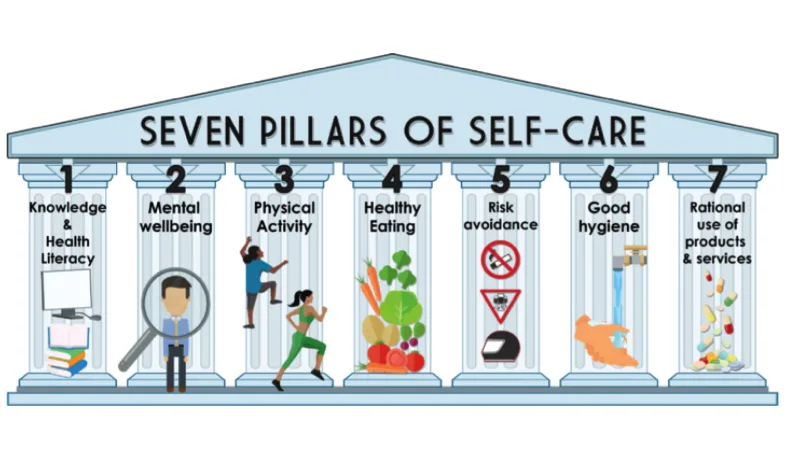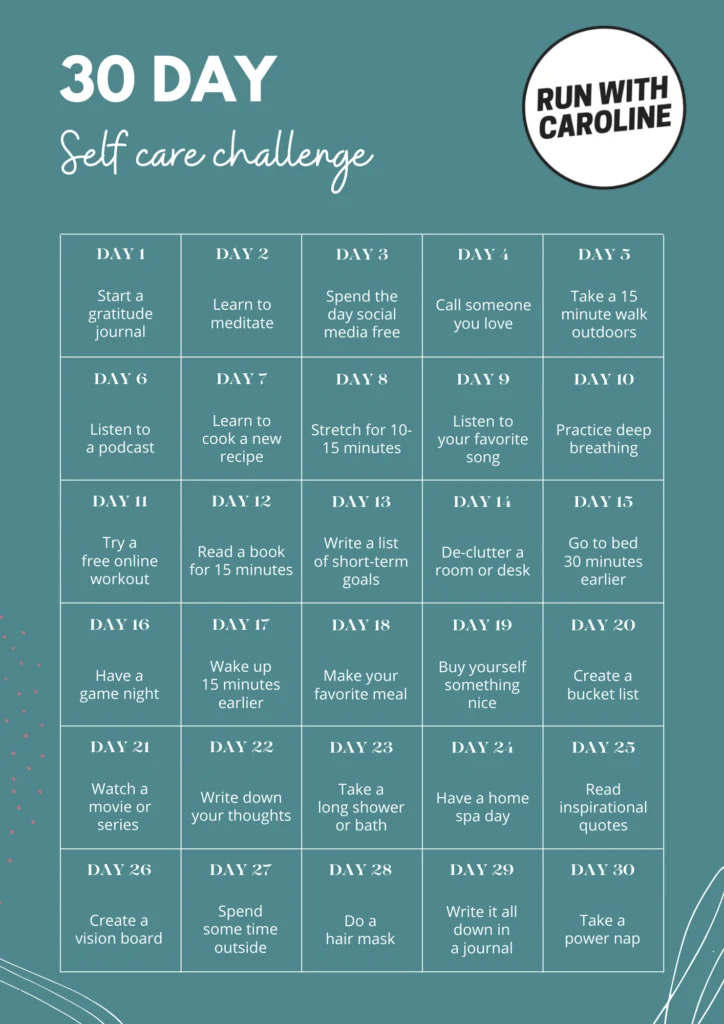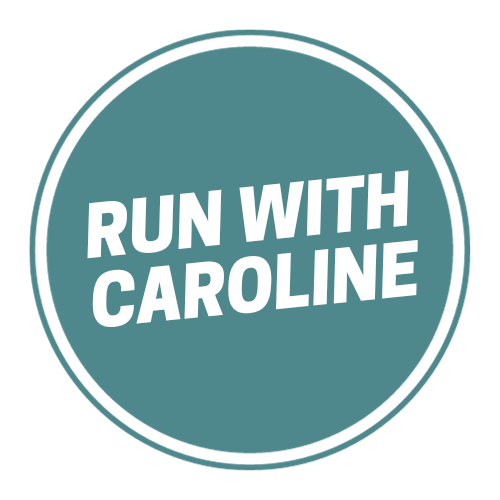Looking for a 30 day self care challenge?
Self care, or more precisely the practice of self care, has become increasingly popular over the last years.
In today’s online world, self care has become an antidote, a detox if you will for people looking to unplug from technology and rest and recharge.
From tips from influencers to videos from wellness gurus, everyone has got something to share when it comes to the practice of self care.
Self care means a lot of different things to a lot of different people.
Oftentimes, your own needs and personal preferences will determine what self care means and looks like to you.
But what exactly is self care? What are the benefits of self care? How can you best incorporate it into your life?
In this guide we’ll explore:
- What is self care?
- What are examples of self care?
- What is not considered self care?
- What are the benefits of self care?
- 30 day self care challenge
Ready?
Let’s go!

What is self care?
Self care is defined as the practice of taking action to preserve or improve one’s own health, wellbeing and happiness.
According the World Health Organization, self care is the ability of individuals, families and communities to promote their own health, prevent disease, maintain health and to cope with illness and disability.”
The International Self Care Foundation goes one step further and has published a visual framework for self care in which there are seven pillars:

A common misconception about self care is that it is is self-indulgent and selfish.
When in fact it’s the practice of looking after yourself so you can be well enough to go about your daily life, do your job and look after others.
Think of it as self-preservation, not self-indulgence.
As you old saying goes: “You can can’t pour from an empty cup.”
Self care is about filling up your cup and keeping it filled by taking care of your physical, mental and emotional wellbeing.
It also means protecting your health and happiness, especially during periods of stress.
Related: 51 inspiring keep pushing quotes to keep you motivated
What are examples of self care?
As we mentioned earlier, self care means different things to different people.
The key though is to practice self care by doing something that you enjoy and that brings you happiness.
Here are some examples of self care:
- Take a bubble bath.
- Listen to your favorite music.
- Go for a coffee at your favorite cafe.
- Make your favorite meal.
- Hold a digital detox day.
- Read a book.
- Take a long walk.
- Go for a run.
- Watch your favorite movie.
- Do a yoga session.
- Practice gratitude.
- Meditate for 15 minutes.
Self care doesn’t have to be a solitary activity.
If you enjoy being around family and friends, for example, and it brings you happiness, then this can be considered an act of self care.
Related: 21 of the best motivational running quotes for race day

What is not considered self care?
There will be times when self care equates to a treat for yourself, such as your favorite bar of chocolate or a refreshing G&T.
Moderation is key when it comes to practicing self care responsibly.
Self care isn’t binging on processed foods or drinking yourself into oblivion every weekend to escape your problems.
Likewise, self care isn’t putting others before yourself.
Your wellbeing matters. It can be harmful if you aren’t prioritising your health and your own needs.
Remember they are equally worthy of care and consideration.
Related: Recovery after running: 5 essential recovery tips after a long run

What are the benefits of self care?
When practiced regularly, self care is a pretty powerful tool to help you cope with life’s stressors.
In today’s society when stress, anxiety and depression are rampant, it has never been more important to practice a routine of self care.
Even small acts of self care can have a huge impact on your life.
Here are the benefits of self care.
#1 Helps you to cope with life’s stressors
Regular self care helps you become more emotionally resilient.
Resilience is the ability to adapt and bounce back in the face of adversity.
You may experience health issues, work stress, money worries or other difficulties on more than one occasion in your life.
One of the key ways to prime your body and mind to deal with these situations is to practice self care.
#2 Helps you rest and recuperate
Taking the time you need to rest and recuperate from daily life, especially if you have a demanding job or a busy family life, is an appropriate way of maintaining self care.
Equally, if you live with a chronic health condition and maintaining self care is a priority, rest and recuperation are essential.
#3 Improves your mental health
According to a study from the National Institute of Mental Health, self care can play a role to maintain mental health and help support treatment and recovery in people that have a mental illness.
#4 Lower the risk of illness
The International Self Care Foundation found that overall it is estimated between 70-95% of illnesses are managed without the intervention of a doctor when the first treatment response is self care.
#5 Increase your energy levels
Self care helps to boost your energy levels.
When you make more time for yourself and you put your needs first, you’re more likely to feel happier and more motivated.
You may also find that you have more energy to put towards important things like your career and family.
The bottom line? Regular self care can help you lead a fuller, more satisfying life.
Related: Motivation to go running: 5 reasons to love running in January

30 day self care challenge
Now you know more about the benefits of self care, here is the 30 day self care challenge.
Why not give it a try?
Hopefully it will give you some 30 day challenge ideas!
- Start a gratitude journal
- Learn to meditate
- Spend the day social media free
- Call someone you love
- Take a 15 minute walk outdoors
- Listen to a podcast
- Learn to cook a new recipe
- Stretch for 10-15 minutes
- Listen to your favorite song
- Practice deep breathing
- Try a free online workout
- Read a book for 15 minutes
- Write a list of short-term goals
- De-clutter a room or desk
- Go to bed 30 minutes earlier
- Have a game night
- Wake up 15 minutes earlier
- Make your favourite meal
- Buy yourself something nice
- Create a bucket list
- Watch a movie or series
- Write your thoughts down
- Take a long shower or bath
- Have a home spa day
- Read inspirational quotes
- Create a vision board
- Spend some time outside
- Do a hair mask
- Write it all down in a journal
- Take a power nap
30 day self care challenge PDF

- 5 things I wish I’d known before returning to running - March 3, 2024
- Running 20 minutes a day: Benefits + how to start - January 27, 2024
- How to run your first 2 hour half marathon - January 16, 2024
